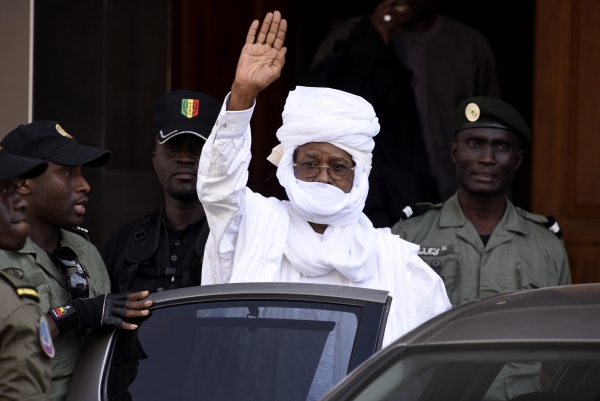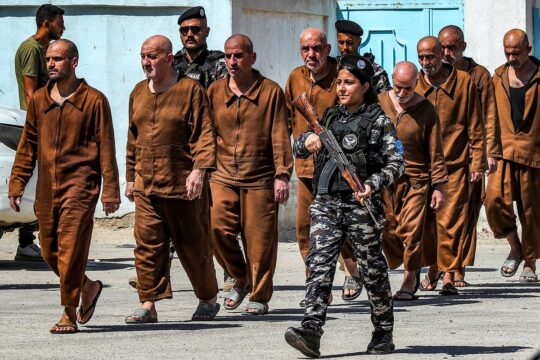The life sentence against former Chadian president Hissène Habré handed down on May 30 by the Extraordinary African Chambers (EAC) in Dakar marks a historic turning point for transitional justice. It is historic because of the gravity of the crimes committed (more than 40,000 people killed or disappeared during Habré’s eight-year dictatorship), the fact that the convict was a Head of State, and the nature of the tribunal, an African court in Africa composed of African judges trying an African.
Observers agree that the trial was exemplary. It gave a strong voice to victims, notably women who accused Habré of sexual violence. Habré is thus the first former Head of State personally convicted for rape.
Although exemplary, some regret that this trial only took place more than 20 years after the crimes were committed. But Habré organized his flight into exile, literally buying himself refuge in Senegal, which was challenged only by a change of government there, plus the courage and persistence of victims’ associations supported by Human Rights Watch, notably Reed Brody. Others may accuse the Dakar court of not having tried other senior figures in the regime, including current Chadian president Idriss Deby, who was Habré’s army chief of staff. Finally, French and US support given to Habré for years, in full knowledge of his crimes, was not evoked in Dakar, mainly because the Accused refused to defend himself, whereas he could have used the hearing to make this also a trial of the West. As Florent Geel, head of Africa desk at the International Federation for Human Rights, said in an interview with JusticeInfo: “The Hissène Habré trial shows we are at a crucial moment of history in Africa: either impunity will be reduced through the political will of States that have now the means to do so, allowing Africa to enter a new age of justice and responsibility; or a few heads of State will continue to organize their own impunity, holding back the whole continent, by using for example the Malabo Protocol, which provides for an African Criminal Court to compete with the International Criminal Court (ICC) but also immunity/impunity for heads of State and government and their families. So you see, they are not at all in tune with the thirst for justice of the African people, especially the youth.”
This week also so the trial continuing in Paris of two former Rwandan mayors accused of genocide in Kabarondo. The village priest told the court on Tuesday how refugees in his church had tried in vain to resist the attacks of genocide perpetrators on that "terrible day" of April 13, 1994. Like many other people, Father Oreste Incimatata thought the sanctity of the church, a traditional place of refuge during anti-Tutsi pogroms in Rwanda after 1959, would be preserved. The priest, a Tutsi who is a civil party in this trial, presented himself as a “victim” of the two ex-mayors, Octavien Ngenzi who headed the commune in 1994, and his predecessor Tito Barahira.
In Kabarondo itself, JusticeInfo’s special envoy Sehene Ruvugiro met people who are all following the Paris trial closely. And he reported as follows: “`After waiting for 22 years, we can finally hope for justice,` says Alexandre Higiro, a neighbour of Octavien Ngenzi who was long persecuted and lost all his family.” Even the former killers talk about the mayor: “He manipulated us, used us to exterminate friends, good neighbours. He should be made to pay a heavy price, or demand forgiveness on his knees,” says Léonard Gatera, a former militiaman who confessed.
Transitional justice is not just trials, but also working to record history and preserve the memory of what happened, as explained by JusticeInfo’s Colombia correspondent Christine Renaudat, who tells how this country has put the archives of its civil wars on line: “Everything is there, or almost: the often harrowing testimonies of victims, reports from labour unions persecuted by the army of the extreme right, the tribunal sentences, the documents of certain guerrilla movements, and 8,000 documents declassified by the CIA and the American Drug Enforcement Administration (DEA), given by the National Security Association (NSA), which allow a glimpse into US involvement in the Colombian conflict.”
Our correspondent adds: “Unlike other data banks on past conflicts like those of Guatemala, El Salvador or Argentina, these virtual archives are unique in giving a voice mainly to those who suffered directly from the political violence.”







